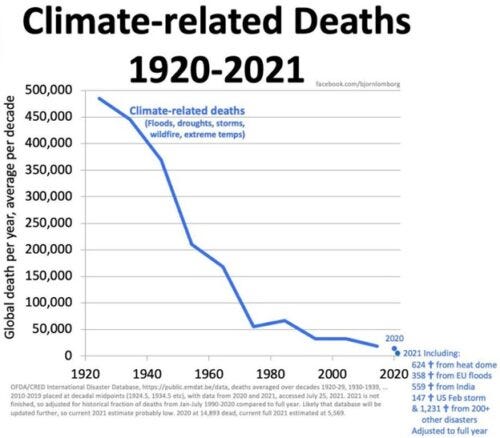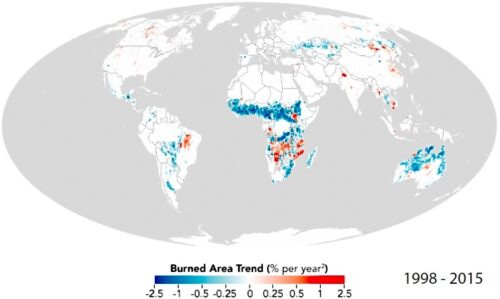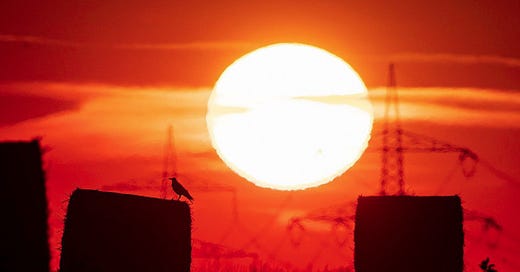HEADLINE: “Politico’s ‘Climate-Related Deaths’ Claim Collapses Under Real-World Data”, by Anthony Watts and H. Sterling Burnett
“Contrary to Politico’s fatuous reporting, climate- and weather-related deaths are falling, not rising.”
Politico’s ‘Climate-Related Deaths’ Claim Collapses Under Real-World Data
Contrary to Politico’s fatuous reporting, climate- and weather-related deaths are falling, not rising.
by Anthony Watts and H. Sterling Burnett
in Extreme Weather, Health, Media, News and Opinion, Politics, Science
Reading Time: 6 mins read
A A
Share on FacebookShare on XwitterShare on Linkedin
In an article in Politico, titled “EU has no plan for rising climate-related deaths, scientists warn,” writer Rory O’Neill warns that “Europe is increasingly grappling with illness and deaths from extreme weather and the arrival of tropical diseases but it has no plan to prevent and cope with rising climate-related health problems.” [emphasis, links added]
This is false.
Evidence from multiple sources suggests that climate and temperature-related deaths globally — and in Europe — are in long-term decline, rather than increasing.
O’Neill continues:
Scientists fear [that mosquito-borne diseases—dengue and chikungunya—once confined to tropical regions,] could become endemic in Europe due to the northward spread of tiger mosquitoes, which have made it as far as Brussels and 20 other towns in Belgium.
Meanwhile, heat-related deaths are projected to increase threefold by the end of the century, while deaths caused by extreme events, including floods and wildfires, are rising.
Perhaps the most glaring lie Politico tells is that deaths from extreme weather events are rising. The truth is just the opposite: climate-related deaths worldwide have declined by more than 98% since the 1920s and are approaching zero. (see Figure 1, below)

As shown by Dr. Bjørn Lomborg and presented at Climate Realism using long-term data from EM-DAT (The International Disaster Database), the annual number of people dying from weather-related disasters (which are often wrongly co-opted to be climate disasters) such as storms, floods, droughts, wildfires, and extreme temperatures has plummeted, despite moderate warming over the past century.
Lomborg’s analysis exposes the inconvenient truth for climate alarmists: modern societies have become vastly more resilient thanks to technology, infrastructure, emergency response systems, and adaptive capacity.
As Lomborg rightly observes, “[t]he reason we don’t hear about this phenomenal achievement is because it doesn’t fit the narrative of climate alarmism.”
It would be surprising if deaths from extreme weather events are rising in Europe, since neither wildfires nor floods are increasing in number or severity – two other assertions made by O’Neill that are simply flat out wrong.
Data discussed in Climate at a Glance: Global Wildfires from three independent sources, including NASA and the European Space Agency, show that globally, wildfires have declined over the past few decades. (see Figure 2, below)

The figure above shows no wildfire increase in Europe, a fact confirmed at Climate Realism here.
Concerning floods, the U.N. Intergovernmental Panel on Climate Change has found no increase in flooding, and recent European floods have not been historically unusual, as discussed at Climate Realism here, here, and here.
Politico’s temperature death assertions are misdirection. O’Neill’s claims completely ignore the significant decline in deaths from cold temperatures, a figure that is far larger than the slight increase in deaths from heat.
O’Neill cites projections that heat-related deaths in Europe could triple by 2100, based on worst-case model scenarios.
But what the Politico article conveniently omits is the fact that cold-related deaths vastly outnumber heat-related deaths, and deaths from cold are on the decline.
A landmark study published in The Lancet analyzed mortality data from 13 countries, concluding that cold kills roughly 20 times more people than heat, as shown in Figure 3 below:

As a result, during the period of modest warming, deaths tied to non-optimum temperatures have fallen dramatically due to a significant decline in deaths due to cold temperatures.
Warmer winters are saving far more lives than warmer summers are endangering.
Yet this life-saving benefit of a modestly warmer climate is completely ignored in Politico’s climate polemic and is not accounted for in the models O’Neill cites.
As pointed out in another Climate Realism article, even within Europe, the bulk of excess mortality during winter comes from cold, not heat. In fact, energy poverty — driven largely by EU climate policies raising energy prices — leaves many elderly Europeans unable to adequately heat their homes, contributing to tens of thousands of avoidable deaths annually.
Politico also attempts to whip up hysteria by claiming that dengue and chikungunya will soon become endemic in Europe due to climate change. The facts tell a very different story.
While the tiger mosquito (Aedes albopictus) has spread into parts of southern Europe, the number of actual dengue cases remains minuscule.
As Politico itself admits (buried mid-article), there were only 304 dengue cases in the EU in 2024 — barely higher than the 275 total cases from the previous 15 years combined.
This is not an epidemic; it is a statistical blip. As Watts Up With That covered here, the principal factors behind the spread of these diseases are not temperature but international travel, global shipping, urbanization, and human settlement patterns — factors which have nothing to do with CO2 emissions.
Perhaps the most egregious assertion in the article was that “nearly 60 million people suffered from serious food insecurity in Europe in 2021, with 11.9 million of these cases attributable to climate change.”
This claim was offered without any causal evidence because no such evidence or data exists. Rather, the claim is based on claims made in climate attribution studies — computer-based guesswork dressed up as empirical science.
Europe remains one of the most food-secure regions on Earth. As Climate Realism has documented dozens of times, crop yields have risen consistently across Europe and the globe, aided by technological advances and CO2 fertilization — the scientifically validated phenomenon where increased atmospheric CO2 boosts plant growth and water efficiency.
If anything, climate change has so far been a net benefit to European agriculture. Far from facing existential threats, farmers in Europe are producing record harvests.
The reason why the EU has no “master plan” to combat rising climate deaths is simple: there is no crisis warranting such a plan. Real-world data shows modern Europe is safer than ever from weather-related threats.
The greatest current public health risk stemming from climate policy isn’t disease — it’s energy poverty. As covered in multiple WUWT posts, Europe’s premature abandonment of fossil fuels has created skyrocketing energy prices, forcing vulnerable populations to choose between heating and eating.
This — not dengue fever — is where actual lives are being lost due to climate zealotry.
As always, Politico’s piece leans heavily on speculative models forecasting dire outcomes by 2100. These models fail empirical validation tests. As Roy Spencer, Ph.D, has thoroughly demonstrated, climate models continue to “run hot,” consistently overshooting actual observed warming.
Even the Lancet Planetary Health scenarios that Politico cites rely on extreme worst-case climate models, RCP 8.5, which climate scientists admit is unrealistic and shouldn’t be used to forecast future climate conditions or impacts.
In summary, Politico’s piece is not journalism — it’s an extended press release for climate activists and unelected NGO bureaucrats, which regurgitates flawed model projections, cherry-picks isolated data points, and conveniently ignores real world data to the contrary that shows climate-related mortality has drastically declined during the recent period of modest warming and that adaptive capacity has never been higher.
If it wants to tout itself as a journalistic endeavor, Politico should spend less time amplifying NGO talking points and more time seeking out the truth, which is easily discovered through an examination of actual existing data.
Read more at Climate Realism
BOTTOMLINE: “If it wants to tout itself as a journalistic endeavor, Politico should spend less time amplifying NGO talking points and more time seeking out the truth, which is easily discovered through an examination of actual existing data.”




